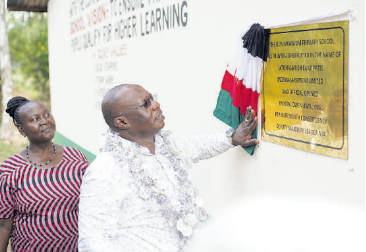
Learners at Mkwajuni Primary
School in the Takaungu, Kilifi county, for years studied in dilapidated
classrooms.
The school, established in 1970, lacked desks, forcing learners to sit on dusty floors and write from their laps. Sitting on a seven-acre parcel of land, Mkwajuni Primary has of 1,376 learners.
School principal Charity Mapenzi joined the institution eight years ago when the learning environment was far from conducive.
“The school lacked enough classrooms, and the few that existed were without desks or other essential amenities,” she recalled.
“If you had seen the school back then, you would have pitied us.”
The school also lacked latrines, leaving over 1,300 learners scrambling for the few available facilities.
“Our girls, who are over 600, had only six latrines. We are now glad that six more have been added, bringing the total to 12. You know, girls tend to take more time in the restroom compared to boys,” she said.
All the classrooms that had fallen into severe disrepair have been renovated.The school has also received 160 desks and a second batch of 160 is expected.
“Most of our learners used to sit on the floor, which affected their handwriting and made it difficult for teachers to read their work. Now, with proper desks, we expect better handwriting and less strain on teachers’ eyes,” Mapenzi said.
A new kitchen is also being set up within the compound to serve the Early Childhood Development pupils.
“During the rainy season, the children would miss their daily porridge because we didn’t have a proper kitchen. Now, a new kitchen is being built,” the principal said.
The developments at the school were initiated by the late Hasmukh Patel, former owner of Mombasa Cement, before his passing last year.
“Today, we are celebrating our partners at Mombasa Cement for giving us what feels like a brandnew school,” Mapenzi said.
Kilifi North MP Owen Baya said Mkwajuni Primary School, one of the oldest in Kilifi, had deteriorated over the years due to natural wear and tear.
“But now, we are here to celebrate our partners, who have taken a keen interest in ensuring this school is rebuilt for the benefit of the community and the children,” said Baya.
He added that Hasmukh Patel was a major contributor to education in the region.
“Hasmukh was the kind of man who went out of his way to help the community. Today, we are celebrating one of his legacies—remodeling and retooling this school for the success of the community.”
The school’s revival is part of a larger corporate social responsibility initiative championed by Hasmukh and continued by Mombasa Cement.
Mohammed Amir, a company official, emphasised their ongoing commitment to education, healthcare, and community welfare.
“The passing of our chairman, Hasmukh Patel, has not deterred us. The young leaders who have taken over remain dedicated to continuing his legacy. Our CSR projects, from paying school fees to supporting schools for disabled children, are ongoing,” said Amir.
Amir refuted reports suggesting that Mombasa Cement had stopped its CSR activities since Hasmukh’s death.
“We still pay hospital bills for those unable to afford them, pay school fees for the needly, provide food for street families in Kibarani, and support schools for the blind. In short, our CSR projects are still running and will continue,” he said.
The company collaborates with
national and county governments to
assist the most vulnerable members
of society.

